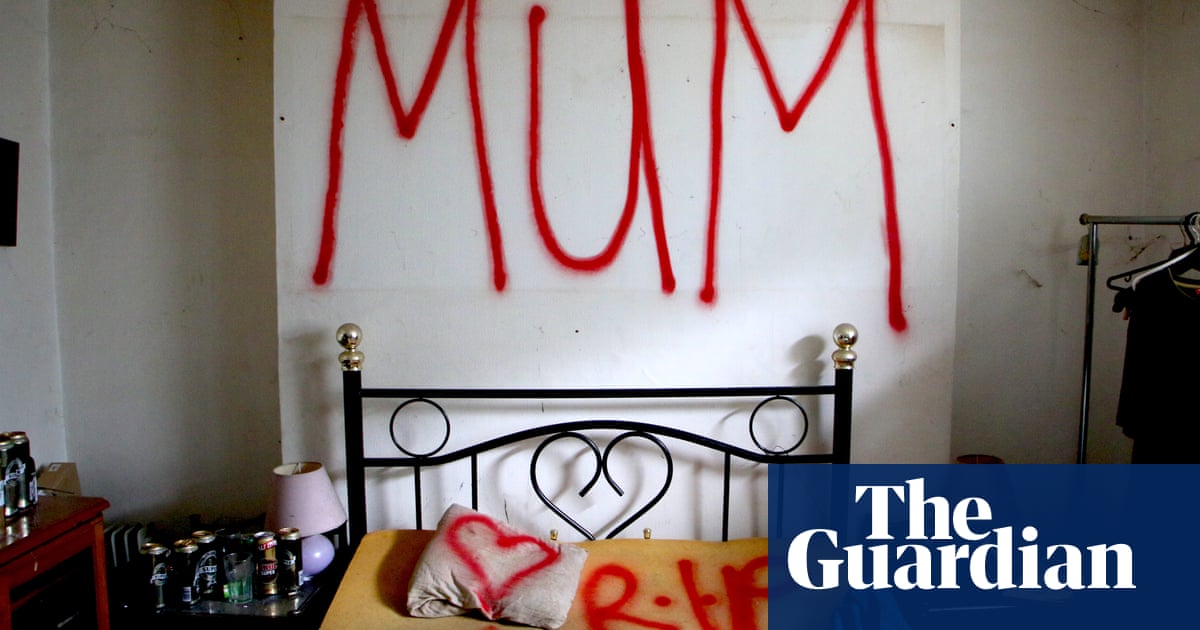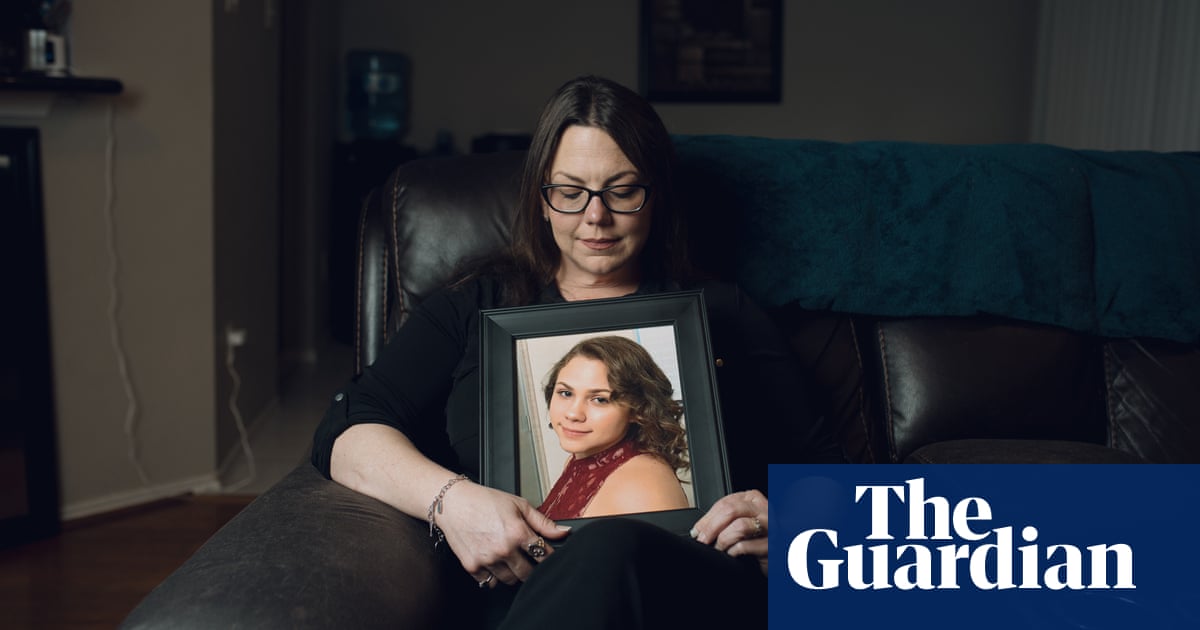
When I call artist and lecturer Lisa Selby, I’ve just finished watching her documentary about her own life: an intimate, raw film touching on addiction, motherhood and trauma rumbling down through generations. So, when her face pings up on my computer, I feel as if I already know the funny, warm woman at the other end of the call.
“Are you OK?” Selby asks, peering down her screen. “You’ve taken in a lot of information today.” It’s a Friday afternoon. She’s in her front room in Nottingham, the walls behind her a lovely shade of forest green, books and plants on the shelves; the dog is dozing on the sofa. It’s kind of her to ask, but really it should be me asking how she’s doing.
The film is called Blue Bag Life and it’s not for the faint-hearted. It began as an Instagram feed in 2017, when Selby posted photographs she had taken at the squalid flat in Greenwich, south London, where her mum Helen died. Helen was a heroin addict and an alcoholic; they were estranged. The photos were Selby’s way of processing her grief, and of getting to know her mother. There is an almost forensic approach to the way she examines the chaos in the photos, posted with what-it-says-on-the-tin captions: “Mother’s smack spoon”; “Mother’s toilet on the day she died”. But scrolling the feed made me laugh sometimes, too. “With Mum at McDonald’s”, reads one caption next to a photograph of a box containing her mother’s ashes on the counter.
That year, 2017, was grim for Selby: losing her mum and then her partner, Elliot Murawski, who was jailed for dealing drugs to fund his own heroin habit. The couple had met at an AA meeting, and when he went to prison, she relapsed back into drinking. Selby documented it all on her Instagram. She called it Blue Bag Life, after the carrier bags you get from corner shops. Selby tells me that some dealers use scraps of the bags to wrap drugs: “blue for heroin, white for crack”. Finding little bits of blue bag down the side of the sofa was a telltale sign that Elliot was taking heroin. They were at Helen’s flat, too. “When I was deep in my trauma, when Elliot was in prison and I’d lost Helen, I started to see them everywhere. In the gutters, floating in the sky. It was a bit American Beauty. But I embraced it.” Selby throws her head back, laughing.
Since then, Selby and Murawski have documented their journey through prison and recovery on Instagram: he in handcuffs at his grandad’s funeral; she waiting at the gate for him on release day. The feed soon took on a life of its own, becoming a forum for other people to share their stories. The couple presented a TedX talk about addiction and prison. Murawski has worked in addiction support and is about to start a university degree in psychology. “He’s getting all distinctions,” Selby says proudly.
Now comes the documentary, also called Blue Bag Life, put together from her photographs and the thousands of hours of footage Selby has shot over the years – a lot of it on her iPhone. “I’m an emotional hoarder,” she jokes. I tell that I feel a bit manipulative, raking back through all her trauma. She looks vaguely amused, and waves away my concern. “Oh, I don’t mind at all. The stuff that I’ve put out there is stuff that I want to explore. I wouldn’t be happy with my cooking being shown. Or me watching rubbish TV. Those things are private.” Another big laugh.
Selby was 10 months old when her mother dropped her off with the babysitter and walked out of her life. She was raised by her dad and grandparents on a council estate in Essex. But, growing up, she idolised her beautiful, bohemian absent mum. Twice a year she got Helen’s autograph, on birthday and Christmas cards. At primary school she was picked on. In the film it sounds horrible; her nicknames were “witch” and “disease”. But today she downplays the bullying. “I just wasn’t as well turned out as the other girls. My dad wouldn’t sit there plaiting my hair, or do the things that mothers would do. But I didn’t care. I loved getting dirty, playing in the mud.”
Helen, she says, visited once a year, if that. “She came to something at school once, wore a big fur hat and made quite the entrance. But I’d already told everyone that she was dead; it was just easier that way for me.” She adds: “I saw a bit more of her when I started drinking and smoking around the age of 14. I was in total awe of her at that stage. Then I got older and realised there was a big problem.” Helen’s partying soon turned into a heroin and alcohol habit. It stopped being glamorous; she’d sit in her spot on the steps of Greenwich library with mates, drinking cans of Special Brew.
Selby is entertaining company. In the film she reveals more of her vulnerable side, speaking her innermost thoughts on a soulful voiceover (edited from her beautiful writing by Josie Cole). “Sometimes I think that longing is the only feeling I’ve ever known,” she tells us. “Do I seek it?”
Having grown up motherless, Selby wonders – in the film – about having kids. Could she be a mum? “‘Mum’ – the word that doesn’t feel good. It’s not my word.” Helen had said she felt suffocated by motherhood and suburban family life. Like her, would Selby lack a maternal instinct? (Though, as everyone tells her, she is warm and a natural nurturer.) At the heart of the film is an interview she shot with Helen six months before she died, in the filthy flat, her notepad full of questions. “Why have you kept your distance from me?” “Are you maternal?” It is devastating.
The idea to turn all of this into a film came after she appeared on the BBC podcast Prison Bag, a series written and presented by Josie Cole about how her life changed when her film producer husband, Rob Bevan, was convicted for fraud. Lisa was one of the “prison wives” that Cole and producer Rebecca Lloyd-Evans interviewed for the series. If you’ve listened to Prison Bag (it’s still available on BBC Sounds), Selby is the woman who does the pregnancy test in the sex episode. In the film, Selby flies out to Greece for two rounds of IVF.
When I speak to Lloyd-Evans over Zoom, she tells me that she wrote to Selby after becoming hooked on her Instagram feed. “I was addicted! Lisa is the most charismatic, compelling person.” She and Cole drove from London to Nottingham to interview her for the podcast; afterwards the three of them went to the pub. “We drank non-alcoholic beers all night and stayed until it was dark. That was the beginning of the friendship.”
When they decided to make a film, Selby handed over a box of old hard drives, memory sticks and DVDs, plus the password to her iCloud with 12,000 videos. The team in London spent a year sifting through it all. Like detectives solving a murder case on telly, they tacked photos and notes up on the wall – mapping out Selby’s life.
The Blue Bag Life film-makers describe themselves as a collective. It gets a bit complicated working out who’s who. Three of them share directing credits: Selby, Lloyd-Evans and editor Alex Fry. Along with writer Cole and producer Natasha Dack-Ojumu, the five of them were all paid exactly the same. “It’s one little way of trying to rethink quite patriarchal structures of film-making,” says Lloyd-Evans. “This idea that there’s one director, often a man, who’s heralded as having all the vision. That’s not how films are made. Films are made in a collaborative way.”
Blue Bag Life arrives at a moment of soul-searching in documentary making. What are the ethical responsibilities that film-makers take on when they walk into an ordinary person’s life and switch on the camera? That question was explored in the recent film Subject, which featured interviews with “stars” of well-known documentaries. Any director who is thinking about making a true crime doc should watch the interview with Margaret Ratliff from The Staircase, just 20 when her mother died and her novelist father was charged with first-degree murder. He let a film crew in, and in the years since, Ratliff’s trauma has been viewed by millions as entertainment.
Lloyd-Evans says that on Blue Bag Life they wanted to get away from this “extractivist” approach to documentary-making. With Selby as co-director, they avoided the power imbalances that left Ratliff feeling exposed and exploited. “It’s about having ownership of your story. Not us coming in and saying: we want to observe you, and then tell a story about your life. This has been such a different way of working. It felt like the right thing.”
Blue Bag Life is part of a wave of films exploring new models for participatory documentary-making. Lloyd-Evans stresses that the mental health of Selby and her partner were the top priority. The budget included therapeutic support for both Selby and Murawski. “We try to look after each other, and you can do that a bit better if your hierarchy is a bit flatter.”
The film is a tough watch, but it’s a story about resilience and love. Final question to Selby: how is she doing? She smiles and takes a moment to think about it. “I’m loving teaching my students and having conversations with them. I teach on a fine art course at Nottingham Trent, the uni that I went to in the 90s. I’ve got a beautiful dog who’s asleep in the sun.
“Life is not perfect,” she adds. “But it’s not for anyone. I feel at peace with myself and I don’t feel the anxiety and the longing that I always felt.”












